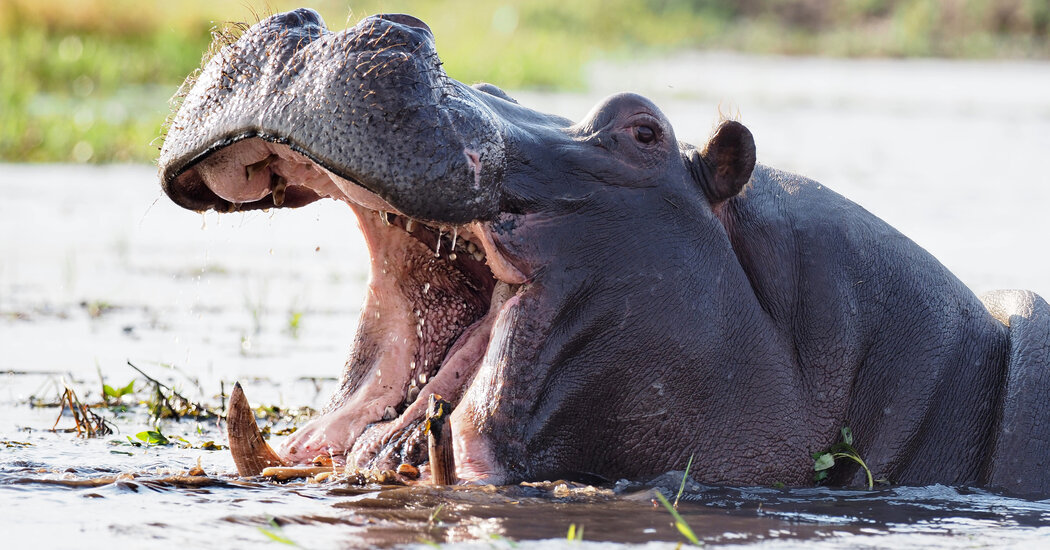

Hippopotamuses are some of the most unfriendly creatures in the animal kingdom.
“Apart from mosquitoes, they are the most dangerous animal in Africa, the ones that kill the most people,” said Nicolas Mathevon, a professor of animal behavior at the University of Saint-Etienne in France. “People underestimate them. They swim very fast and don’t hesitate to attack boats. They are in the water most of the time, but they can move out of the water very fast. Entering their territory can be quite dangerous.”
But you can’t say that hippos don’t give adequate warnings to strangers.
The large mammals make loud noises, and Dr. Mathevon and his colleagues have worked out some of what they mean. Their results, published Monday in Current Biology, suggest that hippopotamuses can distinguish friends from acquaintances, and acquaintances from strangers, by the way they sound.
Hippos are hard to study. It is almost impossible to identify and mark individual animals, and difficult to find them even when marked. They spend the night feeding on land, and then retreat to the water during the day, gathering in groups with a dominant male guarding a number of females and young animals. Individuals may move from one pod to another — the details of their social organization are poorly understood.
But Dr. Mathevon and colleagues persisted. They studied the animals at the Maputo Special Reserve in Mozambique, where several lakes are inhabited by one or more groups, or pods, of hippos. There, the researchers recorded the calls of hippos in seven pods.
The researchers made their recordings cautiously, from at least 250 feet away, using sophisticated video equipment and a shotgun microphone designed to pick up remote sounds. Then they played recordings back to the others while videotaping their responses.
They found that hippos make a lot of noise. Their “wheeze honks” can be heard more than a half-mile away, and their verbal repertoire includes grunts, bellows and squeals. The wheeze honk is generally considered the way hippos announce their presence, but its social function is unclear.
In 10 separate experiments, the scientists played recorded calls to the animals using three tests: first by playing a hippo’s voice to its own group, second using a call from a neighboring group in the same lake and finally with the sound of a stranger from another lake. They made videos of all the responses.
Hippos respond to calls by calling back, approaching the caller or marking their territory by defecating while flicking their tails to spread the feces. The animals responded in some way to recorded calls from any group, but the intensity of the response was lowest when they heard recordings of individuals from their own pod and highest when they heard the honk of a distant stranger. The reaction to a call from a neighboring group was little different from that of one from the same group, and only hearing the call of an animal from a pod of strangers provoked territorial marking.
In animal behavior studies, it can be difficult to maintain objectivity, Dr. Mathevon said. “There’s always a danger to imagine things that do not exist,” he said. “So you have to take some precautions,” in both the techniques for gathering data and the methods used to interpret it.
Before each recording, the researchers waited until the animals were calm and quiet. Five different observers made assessments of the number of hippos, and compared their counts. Researchers not involved in producing the videos scored the responses of the animals on three-point scales using three criteria: distance of approach toward the sound, degree of marking by dung spraying and number of hippos vocalizing.
The study may have implications for the preservation of the species. Hippopotamus populations are declining, and the International Union for Conservation of Nature classifies them as vulnerable.
“The finding that hippos show stronger behavioral reactions to the calls of an unknown hippo can be applied to conservation efforts,” said Diana Reiss, an animal behavior researcher and professor of psychology at Hunter College in New York who was not involved in the study. “It may be important and beneficial to habituate hippos that may need to be relocated to other areas for conservation purposes, to the calls of unfamiliar hippos they will be encountering in new locations.”
The study highlights that there is much to learn about hippo behavior and group dynamics.
“Hippos have a social system that is complicated, with various interactions,” Dr. Mathevon said. “That usually goes along with complexity in the vocal system. We show that hippos can distinguish familiar and unfamiliar voices. But our study is only a first step.”
24World Media does not take any responsibility of the information you see on this page. The content this page contains is from independent third-party content provider. If you have any concerns regarding the content, please free to write us here: contact@24worldmedia.com

Common Mistakes When Using Athletic Field Tarps

High-Performance Diesel Truck Upgrades You Should Consider

Warehouse Optimization Tips To Improve Performance

Fire Hazards in Daily Life: The Most Common Ignition Sources

Yellowstone’s Wolves: A Debate Over Their Role in the Park’s Ecosystem

Earth Day 2024: A Look at 3 Places Adapting Quickly to Fight Climate Change

Millions of Girls in Africa Will Miss HPV Shots After Merck Production Problem

This Lava Tube in Saudi Arabia Has Been a Human Refuge for 7,000 Years

Four Wild Ways to Save the Koala (That Just Might Work)

National Academy Asks Court to Strip Sackler Name From Endowment

Ways Industrial Copper Helps Energy Production

The Ins and Out of Industrial Conveyor Belts